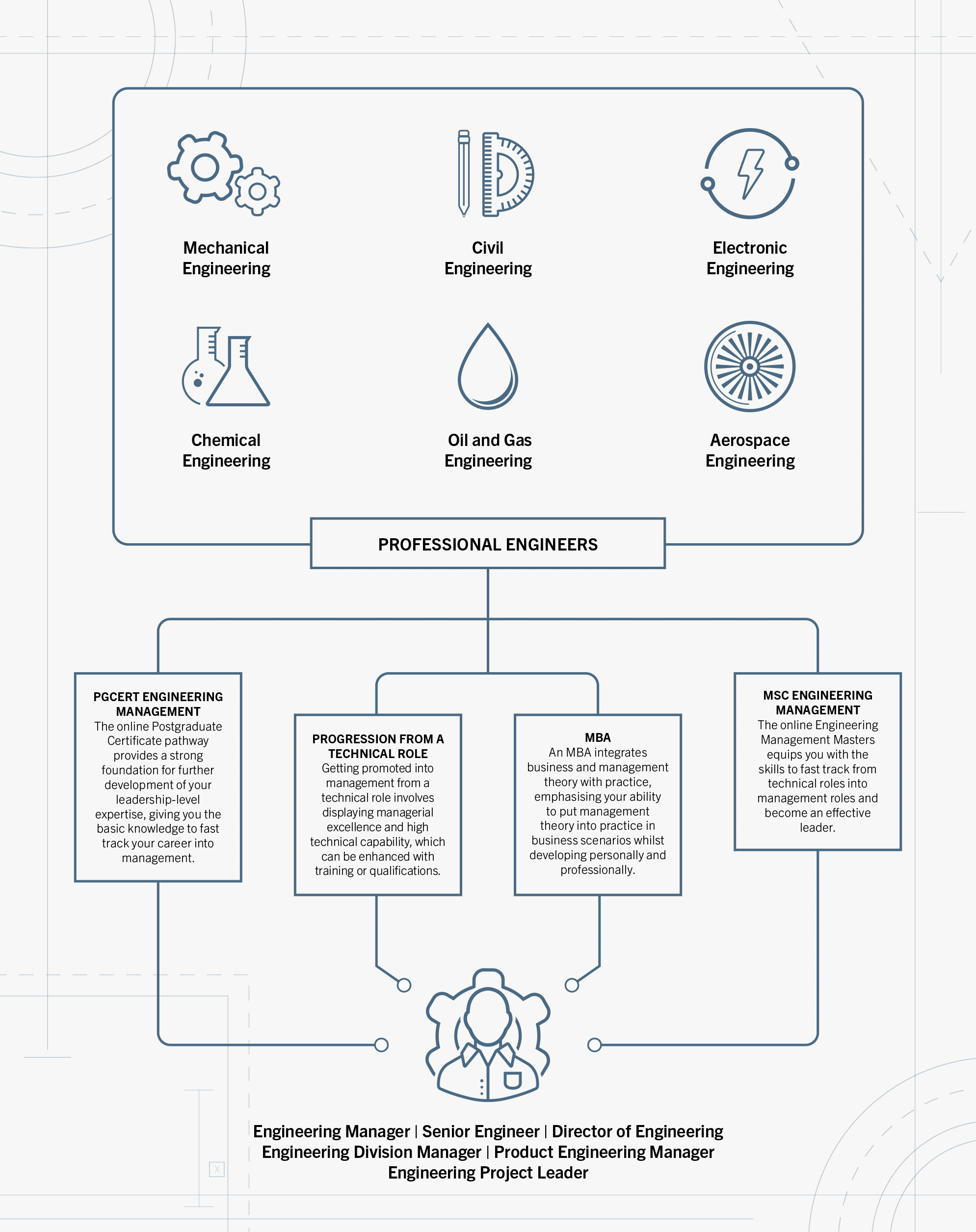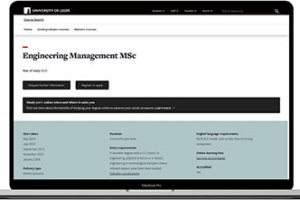How to Become an Engineering Manager

Progressing into Engineering Management is a natural step for many professional engineers, no matter the specialisation you work in. In this blog, we explore how to become an engineering manager and the four key routes you can take to progress.
Management roles in the engineering sector have so many benefits for the individual like influencing change and innovation, multiplying your impact, and becoming multi-skilled in both management and technology. There has never been a more important time for businesses to have technically proficient managers, so filling this skills gap boosts the sector overall.
Ascending the career ladder and moving into managerial positions, although logical for career progression, can be intimidating, regardless of the industry you are looking to progress within. Therefore, knowing what route to take and what will suit you best in your field of engineering will put you in a great position when looking to move into a management role.
How to get into Engineering Management

As with many industries, there are a few progression routes into management within all areas of the engineering sector including:
- Mechanical Engineering
- Civil Engineering
- Electronic Engineering
- Chemical Engineering
- Oil and Gas Engineering
- Aerospace Engineering
Predominantly, these routes involve gaining a high-level qualification (Level 7) to prove your management knowledge and capabilities. However, there is also the opportunity to progress naturally through the sector.
This blog will form the foundations of the various routes you can take to become an Engineering Manager, as well as some tips and advice to get there.

Route 1: Engineering Management MSc
The first route into engineering management is the Engineering Management MSc course. This course would be ideal if you are an early level engineer looking to accelerate your career progression into management, or an experienced engineer looking to gain up-to-date knowledge about trends and the sector.
The course aims to meet the needs of the constantly changing engineering landscape and close the skills gap within management across the sector. Engineers designed and deliver the course, meaning that modules are aligned to meet the most recent demands of the industry through relevant engineering case studies.
For example, specialist modules such as Emerging and Disruptive Technologies, Business Strategy for Engineers and Decision Making for Engineering Managers are parallel to market needs to provide you with high-demand skills. Therefore, tested management strategies are supported with ground-breaking and innovative engineering theories and processes.
Using the knowledge gained in this course, you could influence the strategy of the company you work for and impress employers, aiding them with risk evaluation and identifying opportunities with new technologies, management techniques and approaches to the market.

Route 2: Engineering Management Postgraduate Certificate
The second route into engineering management is the Engineering Management Postgraduate Certificate. This is both a gateway to the first route, the Engineering Management Masters programme, and an award in its own right. This, like the Engineering Management MSc, has been designed by engineers for engineers to fill the expanding skills gap in the engineering sector.
This course is perfect for you if you are an engineer looking to accelerate your career, but do not have the option to commit to the full Masters degree. That’s because this course provides the foundation to progress onto the Masters by studying the first four modules of the course to equip you with the skills and confidence required for management positions. For example, effective business planning, innovation and creativity in engineering, and managing major engineering projects are skills that will put you in good stead as an Engineering Manager.
As a professional engineer, you are involved in implementing the innovative practices and ideas that filter down from senior members of staff who are usually doing the strategic thinking. The modules on this course equip you with those specific skills so that you can become the more senior member of staff doing innovative strategic thinking. Additionally, project management is crucial to success in engineering at every level, as juggling multiple projects at one time is very commonplace; therefore, learning detailed techniques and methods to aid success in this area is advantageous for career progression.
Using the skills and behaviours gained from the postgraduate certificate, you could display project management of major tasks across the business and display control and innovation to senior colleagues, impressing them and gaining that sought-after promotion into management roles.

Route 3: MBA
The third logical route when exploring how to become an engineering manager is a Masters in Business Administration (MBA), one of the most common Masters degrees in the world. The advantage of an MBA is that it can be applied to any industry and is a credible programme giving you management expertise, which you then apply to your role.
An MBA focuses generally on the business skills required to become a successful manager, such as business acumen, strategic thinking, managing people, and global operations. On top of this, an MBA gives you the opportunity to network with managers across a wide variety of sectors, from engineering to marketing to education and so many more.
Case study examples included within an MBA programme relate to real-world challenges in a range of sectors including finance and the creative industries. This allows individuals from a variety of backgrounds to learn management theory that can be applied to their sectors respectively. In comparison to an MSc in a specific subject such as Engineering Management, the MBA programme content would be less specific, but you can adapt the general skills to suit the sector you work within or are looking to progress in.
If you want to gain a broader range of general management skills, an MBA would be a great option for a professional engineer looking to progress into a management role in engineering.

Route 4: Getting a promotion
The final way a professional engineer can progress into management is perhaps not the quickest progression method, as you are not necessarily backed with a professional qualification. This method is to get a promotion from your technical role into a managerial position. Often this might take longer than taking a qualification because you will have to prove through working practices that you are a suitable candidate for promotion.
In some institutions, you might still need some basic training or qualifications in order to progress and keep up-to-date with industry trends; this will provide you with the confidence you may need to convince your seniors that they made the right choice promoting you. It could also be the confidence boost you need to settle into your new role quickly to start making an impact immediately.
According to the Engineering Institute of Technology, there are some key skills engineering employers look for in managers, such as engineering knowledge, communication, professionalism, planning, safety awareness, quality orientation and cultural adaptability. Some of the soft skills can span across management roles in many sectors, but safety awareness and engineering knowledge are explicitly evident for professional engineer looking to progress into management.
Choosing the right route to become an engineering manager
Rising to the challenge of becoming a leader, regardless of the sector, is not an easy or straightforward task. You, as a professional engineer, need to know what the business you are working for wants to see in a managerial candidate and map your route to management backwards from there.
If you are looking for a specific engineering management qualification that gives you the skills and knowledge specific to the industry, considering an Engineering Management MSc or Engineering Management Postgraduate Certificate would be a brilliant decision for you. If you are looking for more general management skills like soft skills, with the opportunity to apply them to the workplace, an MBA might be the right choice. If you can see your progression and it doesn’t require a physical qualification, or you feel you have all of the knowledge and skills you need to progress, opting for that straight promotion decision might work best for you. However, having the qualifications behind you can give you the confidence to show your skills to seniors.
Whatever route you choose to take to become an engineering manager, make sure that you weigh up your options and decide to best suit your personal and professional development.

Did you enjoy this blog? Here's some related engineering content that you may be interested in:
Want to learn more about our online Engineering Management course?

Check out the course content and how to apply.

